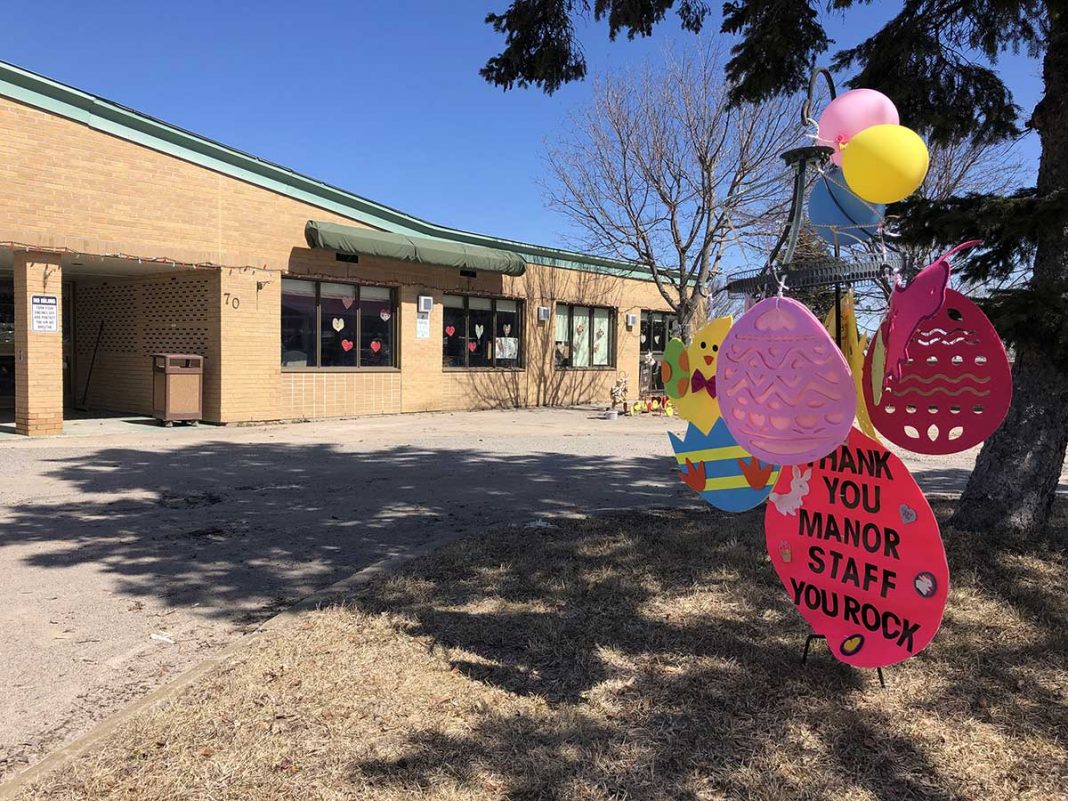MANITOULIN – The advent of the COVID-19 pandemic and harrowing accounts coming out of some southern Ontario long-term care facilities where the virus has already managed to infiltrate has led to some heroic efforts on the part of Island nursing homes in order to defend their vulnerable and close-packed residents from a virus for which humans have no natural immunity. Those efforts have brought along with them challenges for the mental health and well-being of residents and staff alike, calling for equally robust efforts to lift spirits and make connections.
“We’ve done so much, where do I begin?” said Manitoulin Centennial Manor administrator Tamara Beam, speaking to The Expositor following a series of Monday meetings with staff and provincial health officials. “First of all, we locked all the doors. When the Ministry of Health directive came down, it seems like months ago now, but it was just a couple of weeks ago we took steps to lock down.”
It was more than a simple locking of doors; as regular visitors to the facility would know, there is a number-lock system that usually permits visitors to punch in a posted code to gain entry—no more.
“We physically rewired the front door so people can’t get in until they are screened,” said Ms. Beam. “At first we put in visiting hours, but then the word came down Saturday to restrict entry. The only people coming in are our staff.”
Deliveries are strictly monitored, with calls ahead by LifeLabs ensuring that there are medical samples that need to be picked up before the delivery person even sets out for the facility. “They call us and if, and only if, they have stuff to pick up do they even come. Even then, there is no physical contact between the staff and the delivery people. The same goes for our food deliveries. The staff opens the dock doors and leave. The delivery people, Sysco, bread, milk, they come in and drop off the supplies with no physical contact with staff.”
“There are lockers here and staff are encouraged to change into their uniforms here and to take them off and change into their street clothes before they go home,” she said.
Even the medical staff who come into the facility are isolated, bringing in personal protective gear to protect the residents and staff from any contact. Doctors and other health professionals are now conducting examinations via video conferencing as much as possible.
“So our residents are still getting their regular weekly checkups,” said Ms. Beam.
Staff and residents are having their temperature taken twice a day, with 38°C acting as the case directive. One of the bonuses of the lockdown regime is that there are actually less high temperatures than would normally be found among the population. “Basically, nothing is getting in right now and that is a very good thing,” said Ms. Beam. “Right now I don’t have anything in here.”
On the downside, the increased isolation is having an impact on the residents’ mental health and well-being, admitted Ms. Beam. But the Manor is taking steps, along with great community volunteers such as Wendy Gauthier and Linda Bowerman, to help lighten any mental duress being felt by the residents due to increased isolation.
“Our activities co-ordinator Julie (Omnet) has set up a Facebook page, ManorResidents, where we can do virtual meetings between our residents and their families,” said Ms. Beam. “That’s really one of the hardest parts for a lot of our folks.”
A closed courtyard provides the ability to get some fresh air safely isolated from the general public and even entertainment is close, but not too close, at hand.
“We have some wonderful entertainers who have volunteered to perform outside, up on a rise well away from the residents but where they can still hear the music,” she said.
The aforementioned volunteer cadre have marshalled local children to create a festive Easter montage, ‘Hop into Easter,’ on the lawns outside the residence with displays and posters and the residents have responded in kind with window decorations.
“Easter is going to be hard on a lot of the residents with families not able to visit,” said Ms. Beam, but she said the virtual connections are working well and anyone is encouraged to pop by virtually to set up a meeting, even if you don’t know any of the residents.
The Wikwemikong Nursing Home made the national news recently with a montage of photos of their residents holding up signs thanking people for keeping them safe.
Wikwemikong Nursing Home administrator Cheryl Osawabine-Peltier noted that all visitors are restricted from the residence, with a strict exception for palliative care. “We (residents and staff) are trying to keep busy and engaging in all kinds of stuff,” she said. Her facility also shut its doors following the Ministry of Health directive on March 14.
“That includes our outside staff such as physiotherapists and our health professionals are doing virtual examinations,” she said. “Staff were told ‘stay home.’ We are all under the same rules—don’t even go to the grocery store. We are ordering in groceries for the staff with our suppliers. You don’t need to be wandering around a grocery store unless it is absolutely necessary.”
The nursing home is also facilitating virtual visits and has been incorporating a lot of hitherto unfamiliar technology in order to maintain family connections.
“We are using Zoom (a popular video conferencing platform)—oh-so many Zoom meetings, I have never had so many Zoom meetings—and Facetime, Facebook Live,’ said Ms. Osawabine-Peltier. “My assistant is fairly young and she has hooked us up with TikTok (a social media platform very popular with youth).”
“Meeting the directives coming out to protect nursing home residents is a constantly moving target,” said Ms. Osawabine-Peltier. “It is changing daily for long-term care.”
When it comes to new residents, the home is accepting them, but while at first they were told there was no need for isolation, now the protocol is a full 14 days of isolation.
A lot of the new rules are very difficult to implement, Ms. Osawabine-Peltier admitted. “Especially for the residents with dementia and at mealtime. They want to come in to the dining room and it is hard to stop them.”
Ms. Osawabine-Peltier encouraged those outside the residence who want to help to write and connect through letters. “Anything like that, kids sending pictures, it really helps to lighten the day. I was looking at an ‘adopt a grandparent’ program I saw a while back and maybe we can get that going too. A lot of our residents really enjoy letter writing, so you could become a pen pal to brighten someone’s day.”
The Expositor also reached out to Jarlette Health Services, the company that runs Manitoulin Lodge nursing home in Gore Bay, but did not hear back by press time Monday.




